The wounded victims of Sri Lanka's child marriage law
- Published
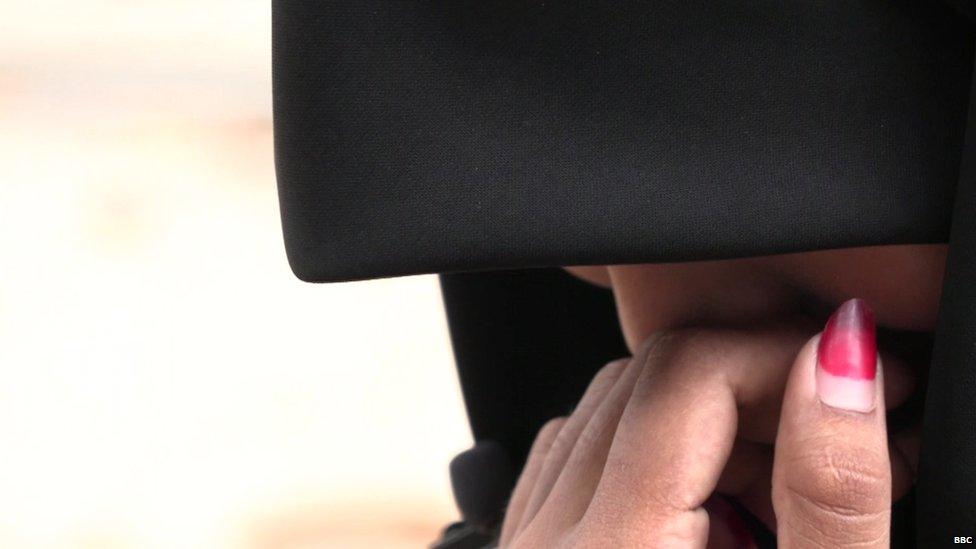
Shafa is only 16 but has already endured a forced marriage and a miscarriage
In Sri Lanka the legal marriage age is 18, but under a decades-old community law, much younger Muslim girls can get married. As calls grow for this law to be amended, BBC Sinhala's Saroj Pathirana meets one young girl forced to marry against her will.
When Shafa* was 15, she was forced to get married. "While studying for exams, I fell in love with a boy," Shafa said, tears running down her cheeks.
"My parents did not like it. They sent me to my uncle's place. While I was studying there, a regular visitor told my aunt and uncle that he wanted to marry me."
Shafa, who comes from a Muslim family and lives in a remote village in Sri Lanka, refused. She wanted to marry the boy she loved, after completing her secondary school education.
But despite her objections, her uncle and aunt arranged for her to marry their friend.
Whenever she objected to the marriage, she was beaten. Her uncle and aunt even threatened to kill themselves if she did not listen to them.
"I cut my arms as there was no other option," said Shafa, pulling up her sleeves to show the scars. "I also took some pills from my uncle's place.
"While I was being treated in hospital, they bribed the doctors and took me - together with my saline bottle - to a private hospital. A few days later they forced me to marry that man."
'I cut my arm and said I don't want this marriage'
Shafa decided to stay with her young husband as she could see no escape but he suspected she was continuing her relationship with her boyfriend.
"He regularly beat me," she said. "When I told him that I was pregnant, he picked me up and threw me to the floor.
"He then told me that he only wanted me for the one night, he'd already had me and didn't need me any more."
It was at the hospital that she realised she had lost her baby as a result of the violence.
When Shafa went to the police, they did not take her complaint seriously.
One day she got a call from the mosque in the village. There, her husband agreed to continue the marriage but she refused.
A few days later, she started getting phone calls and text messages from strangers, asking how much she charged to sleep with them.
Shafa realised that her husband had published her photograph and telephone number on social media. The callers threatened her with filthy language and told her: "We got your number from your husband."
"I recorded all these calls. And I still have all the text messages," said Shafa, who could not stop crying but was determined to tell her story.
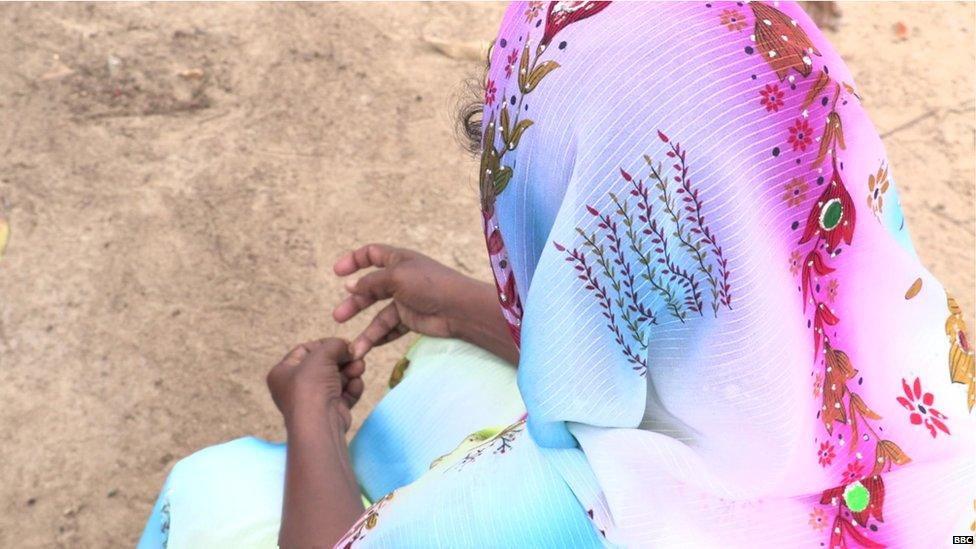
Shafa's mother says she has struggled to hold the family together and seek help for her daughter
Shafa's father did not want to get involved with what was happening.
But Shafa's mother is now taking her daughter to a social welfare centre so she can get psychological and legal help in the wake of her traumatic marriage.
They visit the centre in secret because openly seeking psychological help is still a taboo in Sri Lanka.
Shafa's mother supports her five children by doing daily labour jobs in the village. She was evicted from her hometown by Tamil Tiger separatist rebels in 1990.
"I sent my daughter to my brother's place due to one incident. I never thought this would happen to her," she said.
She says she objected to her daughter being forced to marry but her brother did not listen to her.
"It was a forced marriage," she said. "I fear for her safety and her education now [because of the lies her husband has spread about her]. She can't go to classes. She can't even travel on a bus. Her whole future is uncertain."
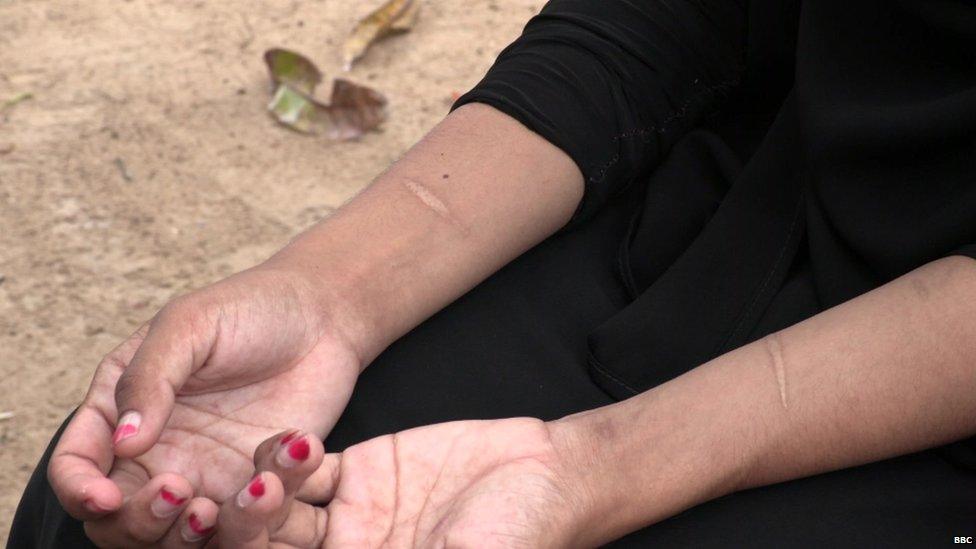
Shafa still has scars on her arms from where she self-harmed to avoid a forced marriage
Every year, hundreds of girls like Shafa from Sri Lanka's Muslim minority are forced to get married by their parents or guardians.
Human rights lawyer Ermiza Tegal says Muslim child marriages have gone up from 14% to 22% within a year in the eastern province, a rise attributed to increased conservatism.
Shafa was 15 years old but Muslim women's groups have documented girls as young as 12 being forced into marriage.
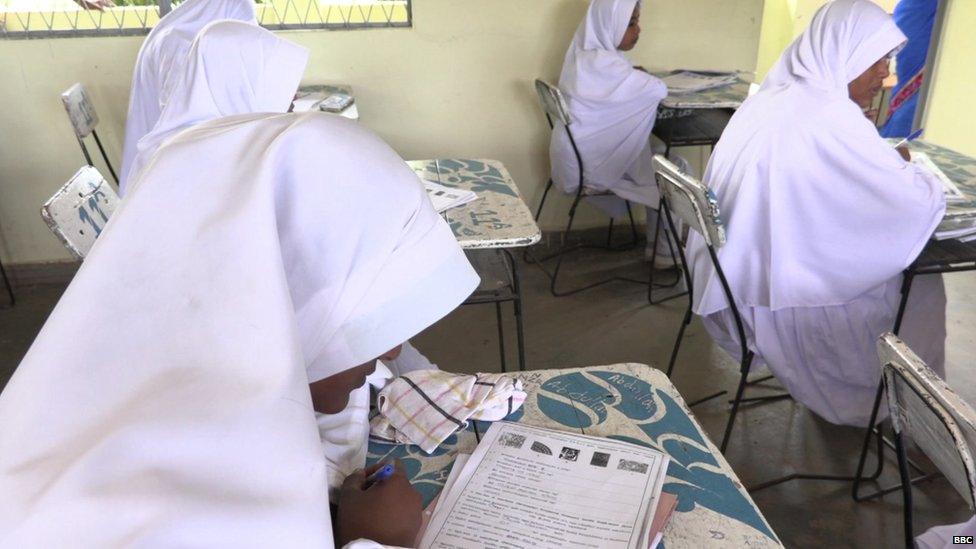
Muslim girls in Sri Lanka are at risk from forced child marriage due to the lack of legal protection
Sri Lanka's common law does not allow underage marriages. The legal age is 18. But a decades-old community law called the Muslim Marriage and Divorce Act (MMDA), external allows Muslim community leaders, who are mostly men, to decide the marriage age.
There is no minimum age, although a marriage involving a girl under 12 requires special permission from an Islamic magistrate.
Girls and their mothers have suffered in silence for decades but Muslim women activists are now coming forward to seek reform of the MMDA, despite serious threats from mullahs and other conservative community leaders.

Child marriage: the facts
One in three women in the developing world are married before they reach the age of 18
The nations with the highest rates of child marriage are Niger (76%), Central African Republic (68%) and Chad (68%)
As a region, South Asia has the highest rate of child marriage - 17% of women are married by the age of 15 and 45% by the age of 18
Bangladesh has the highest rate of child marriage in the region (52%), followed by India (47%), Nepal (37%) and Afghanistan (33%)
In Sri Lanka child marriage rates are at 2% by 15 and 12% by 18
Globally all but six countries specify minimum marriage ages - but many make exceptions on religious or other grounds, and in some nations laws are ignored
Sources: Girls Not Brides; Pew Research Centre

Sri Lanka plans to reform its constitution and so activists believe now is the moment to act.
The United Nations and the EU have also recently urged the government to amend the MMDA and other discriminatory laws.
But there is not a lot of hope, because a committee set up by the government nearly 10 years ago to look into MMDA reform failed to come up with any concrete proposals.
Muslim groups such as Jamiyathul Ulama and Thawheed Jamaath have long resisted the call for change.
Thawheed Jamaath treasurer BM Arshad said the organisation supported reforming the MMDA as long as proposals came from within the community, but it opposed setting a minimum marriage age.
"Neither Islam nor Thawheed Jamaath accept child marriages," said Mr Arshad. "But Thawheed Jamaath will never agree to setting a minimum age for marriage.
"The need for the girl to get married should be the criteria for a marriage," he said. "Some girls may not need to get married even after 18 years of age. It is the right of the person getting married to decide when they do."
He denied accusations that his organisation threatens Muslim women activists.
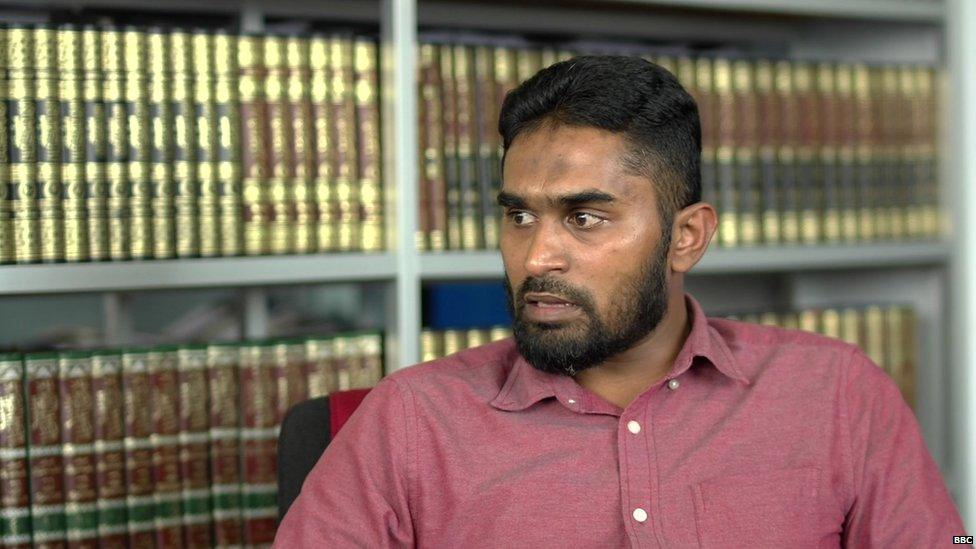
Thawheed Jamaath spokesperson BM Arshad opposes a minimum age for marriage
The centre Shafa and her mother attend has helped more than 3,000 Muslim women with various issues over the last three years, including 250 child marriage victims.
"I have to stay away from home because of the threats from men," said the social worker who runs the centre. "I'm afraid to send my children to school.
"I have had to stay in my office and now I'm even afraid to take a tuk tuk home."
Activist Shreen Abdul Saroor of the Women's Action Network (WAN) was one of the few Muslim women who dared to reveal her face and her identity.
"Child marriage is statutory rape," she said. She insists that 18 years should be the legal marriage age for all communities in Sri Lanka, irrespective of their nationality or religion.
A child is not physically mature enough to give birth to another child and they miss out on their education, she says.
"When we look at these children getting married, it affects the whole community. The whole community goes backward," said Ms Saroor.
"My message to the Muslim community and religious leaders is please do not destroy the childhood of these children."
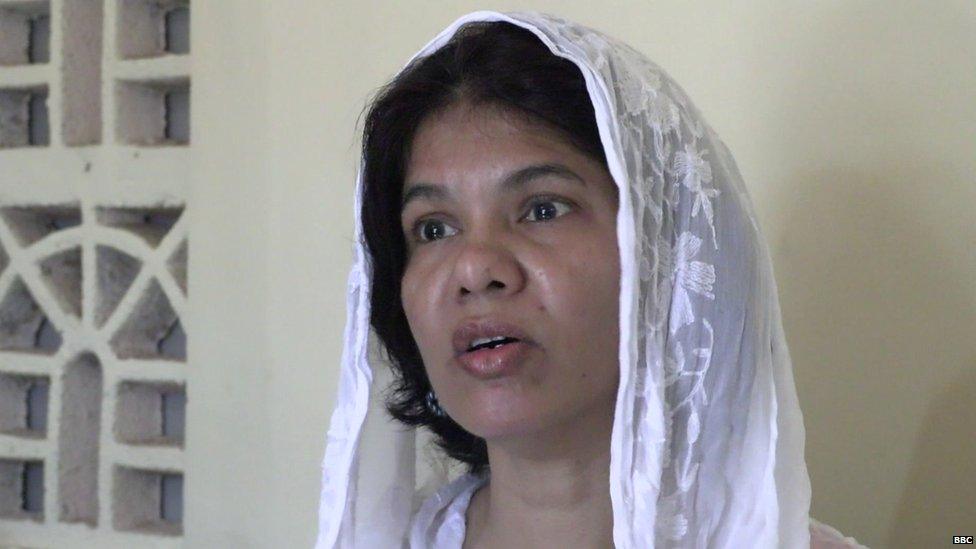
Activist Shreen Saroor calls on the Muslim community to protect their girls
Despite her trauma, Shafa was always a brilliant student and was determined to resume her studies. Her family hope she can get a good job but she still faces many challenges.
"Boys regularly come to me and make rude jokes when I go to tuition classes," she says. "This is serious harassment. I feel down. I'm helpless. I don't know what to do."
But she refuses to let the bullies win, saying she wants to be a lawyer.
"Is it because you want to help other victims like you?" I asked. "Yes," she said.
As her smiling eyes meet mine, I sense her determination.
*Shafa's name has been changed to protect her privacy.